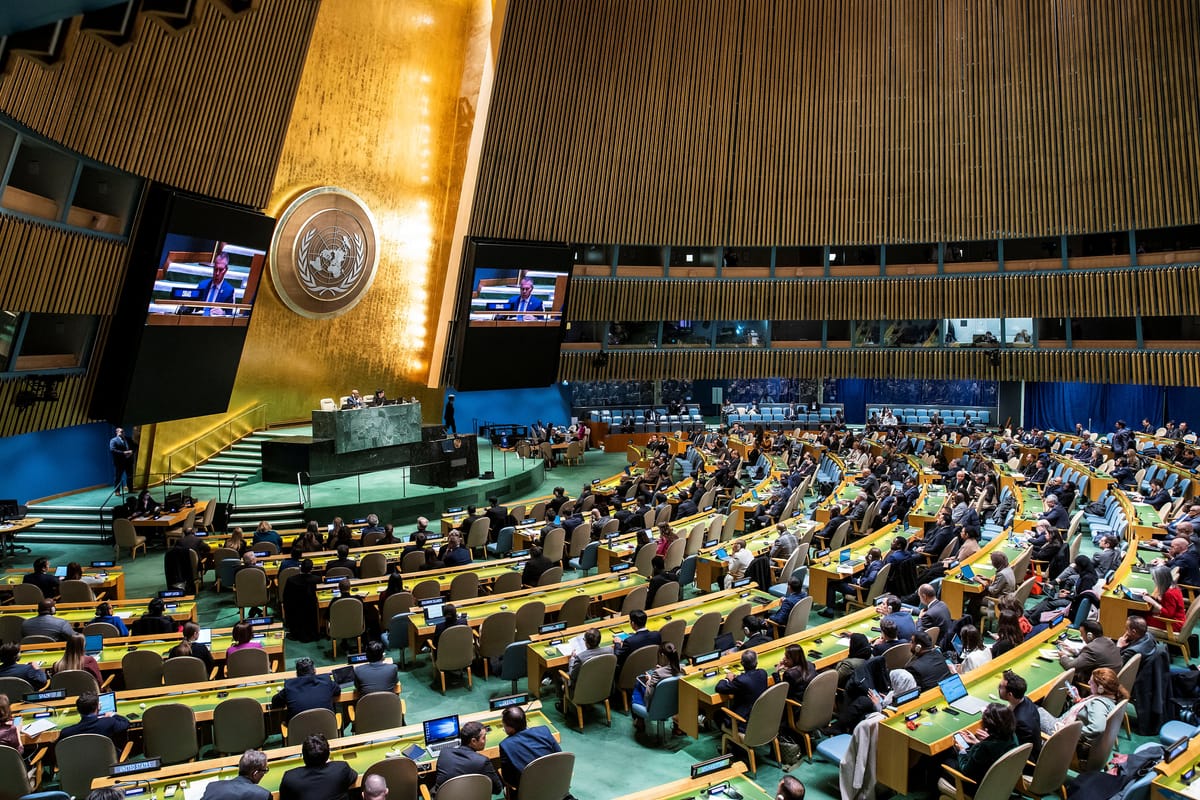The UN General Assembly has demanded a humanitarian ceasefire in Gaza
On Tuesday, the UN General Assembly voted for an immediate humanitarian ceasefire between Israel and Hamas and the unconditional release of all hostages.

A few minutes every morning is all you need.
Stay up to date on the world's Headlines and Human Stories. It's fun, it's factual, it's fluff-free.
The backstory: Since the October 7 Hamas attacks on Israel and the following Israeli raids on Gaza (plus escalating violence in the West Bank), we’ve been keeping you updated on the breaking news coming out of this conflict. At this point, Israel’s military campaign has killed an estimated 18,000+ Palestinians, with the Israeli attacks now spreading all across the 41-kilometer (25-mile) territory. The UN has warned that the situation is approaching a genocide. On the other hand, Israel has vowed to completely wipe out Hamas, which rules the Gaza Strip but has been deemed a terrorist organization by many.
More recently: UN Secretary-General António Guterres has been pushing for a resolution to break the ongoing conflict. In October, the US vetoed a UN Security Council (UNSC) resolution calling for a “humanitarian pause” because it didn’t mention Israel’s “right of self-defense.” In November, Hamas and Israel agreed to a temporary truce to get aid into Gaza, give civilians a chance to get to safety and to exchange captives. It lasted seven days, and then fighting resumed. Last week, Guterres enacted Article 99 of the UN Charter, which let him throw a ceasefire resolution into the UNSC and demand an emergency vote. The US vetoed this resolution, too, saying that it wouldn’t “move the needle forward on the ground in any concrete way” and that, without wiping out Hamas, a ceasefire would “only plant the seeds for the next war.” The US also criticized the resolution for not condemning Hamas’s October 7 attack and not mentioning Israel’s right to defend itself. But, the American public largely supports a ceasefire, and according to a tracker from the Armed Conflict Location & Event Data Project, there have been hundreds of protests in cities across the country since the start of the conflict.
The development: On Tuesday, the UN General Assembly (UNGA) voted for an immediate humanitarian ceasefire between Israel and Hamas and the unconditional release of all hostages. UNSC resolutions are legally binding, but UNGA ones aren’t. Still, the UNGA is reflective of global views, and its resolutions are important for peacemaking. The resolution was approved with 153 votes in favor, 10 against (including the US and Israel) and 23 nations abstaining.
It doesn’t totally sidestep the Security Council's rejection, though. Here’s how it works: Egypt and Mauritania put forward Resolution 377A (V), known as “Uniting for Peace,” for an emergency meeting of the UNGA, asserting the UNSC hasn’t been able to maintain global peace, one of its main jobs, because of a lack of unanimity. This means that the UNGA can get involved to make recommendations, although they are legally nonbinding.
Key comments:
"Uniting for Peace does not enable the General Assembly to circumvent Security Council decisions,” said Professor Rosa Freedman, University of Reading professor of law, conflict and global development, who is also an expert on the UN and international law. “Essentially, the resolution sets out that if the Council does not take action to maintain international peace and security, the Assembly may (at a regular or emergency session) make recommendations to restore that peace and security. It does not actually give the Assembly the Council's enforcement powers, but rather enables the Assembly to use its existing powers or to make recommendations that member states may or may not choose to adopt.”
“There is no doubt a ceasefire is needed if we are to bring an end to hell on Earth,” said Philippe Lazzarani, the commissioner general of the UN agency for Palestinian refugees, UNRWA. He also said that Palestinians feel “stripped of dignity, humiliated and psychologically broken,” adding, “The dehumanization of Palestinians has made the unbearable bearable for the international community.”
“In the name of humanity, I ask you all once again: Stop this violence, now,” said UN general assembly president Dennis Francis at the UNGA ceasefire resolution meeting on Tuesday.
”A ceasefire right now would be temporary at best, and dangerous at worst,” said US Ambassador to the UN Linda Thomas-Greenfield. “Dangerous to Israelis, who would be subject to relentless attacks, and also dangerous to Palestinians who deserve the chance to build a better future for themselves free from a group that hides behind innocent civilians.”
“A ceasefire will only benefit the terrorists that steal the humanitarian aid for themselves,” said the UN representative for Israel, Gilad Erdan, adding that it would be a “death sentence for countless more Israelis and Gazans.”




Comments ()